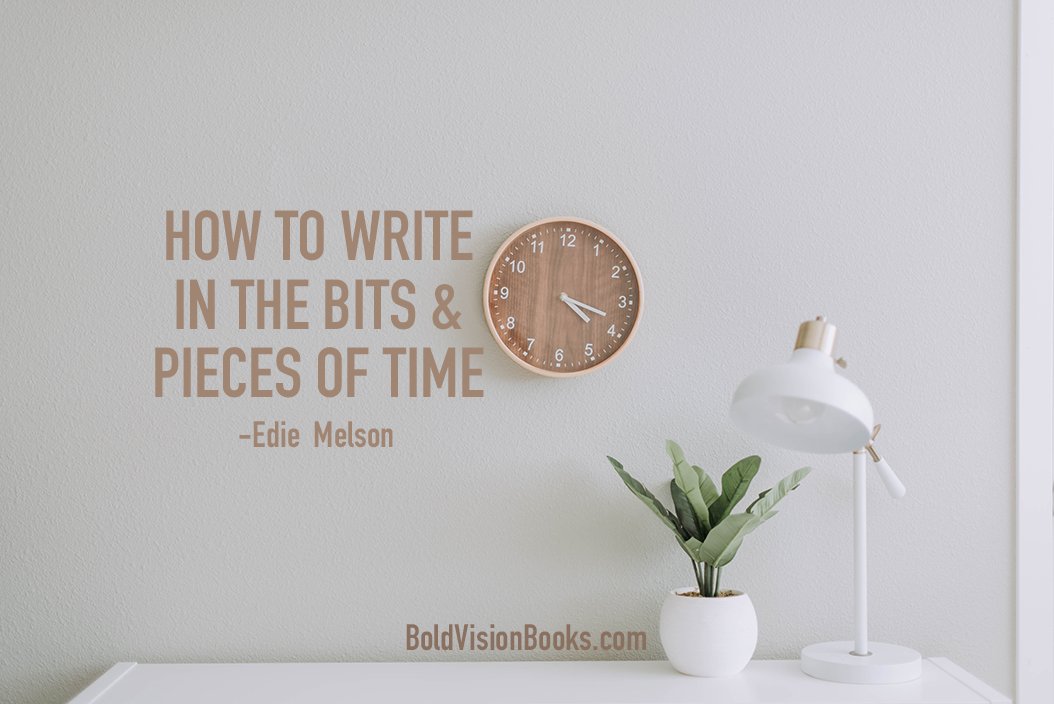How to Write in the Bits & Pieces of Time
By Edie Melson @EdieMelson
I had always believed that I needed at least an hour, and preferably three, to make any progress at all with my writing.
I couldn’t have been more wrong.
The truth is, those small bits and pieces of time we all have add up to a lot. And wasting them can severely hamper our ability to meet deadlines and find success.
Over the years, I’ve learned how to use the time I have, even if it’s just ten minutes. Today I want to share the specific things I do to help increase my productivity when long stretches of writing time just aren't possible.
Tips for Finding Time to Write
1. Decide to use what you’ve got. This is the biggest part of the puzzle. If you wait for perfect circumstances, chances are you’ll never finish your book. Truthfully, things rarely line up. When they do—celebrate! When they don’t—just decide to work harder.
2. Do your pre-work. There are a couple of things I recommend you do before you start writing in those short bits of time. AND they can also be done in bits and pieces.
Have a road map of where your book is going. I’ve learned that I work better from a scene map (a list of all the scenes I want to include in my book). You may not have something that detailed. But you should know what you want to write about next. After you finish a scene, before you get up, make a couple of notes about where you want to go from there.
Have a foundation of research to build on. I take a few weeks, before I start writing, to do my research and compile my notes.
3. Don’t overthink what you’re writing. Sometimes you’ve got to write junk before you can get to the good stuff. Beyond that, the only thing you can’t fix is an empty page. So put some words on the page and keep moving forward.
4. When you’re writing your first draft, don’t stop to research. When I only have fifteen minutes, I could waste all of it, looking up a fact I need to know. When I come to something I need, I make a note and keep writing. I can look it up after my first draft is done and I begin editing.
5. If you’re working on revisions, make a list . . . actually, make several. Make a list of things you need to look up. Also make a list of scenes you need to add. By making these lists you have a roadmap for your revisions and you don’t have to waste time figuring out what to do next.
These are all great tips if you’re writing a book, but what if it’s an article or something small that you’re working on? Take the principles I’ve outlined and structure your writing time, no matter what you’re working on.
Most of all, learning to work in the bits and pieces of time that life sometimes throws us takes practice. When I first started, I spent a lot of time frustrated because what I was writing didn’t measure up. But within just a couple of weeks, my frustration lessoned and productivity increased—exponentially.
Don’t assume you can’t work this way. I did, and I lost years of productivity. Instead, take a chance and learn how to keep moving forward.
Now I’d love to find out what tips do you have to work in less than ideal circumstances.
Edie Melson is a woman of faith with ink-stained fingers observing life through the lens of her camera. No matter whether she’s talking to writers, entrepreneurs, or readers, her first advice is always “Find your voice, live your story.” As an author, blogger, and speaker she’s encouraged and challenged audiences across the country and around the world. Her numerous books reflect her passion to help others develop the strength of their God-given gifts and apply them to their lives. Connect with her on her website, through Facebook, Twitter, and Instagram.

